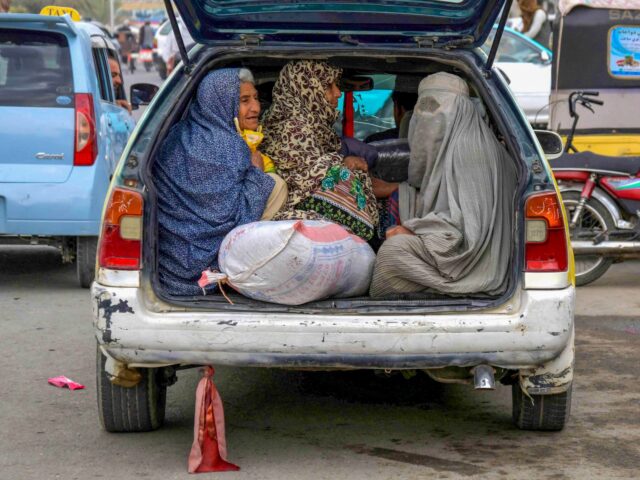A senior Taliban terrorist announced that the jihadists would ban women from reciting the Quran or performing certain Islamic prayers within earshot of themselves, multiple Afghan outlets reported this weekend.
The restrictions appear to be part of a larger package of “morality” reforms to Afghan law that also effectively ban women from appearing in public or speaking at a volume loud enough to be heard by others, among other atrocities. The Taliban’s “Ministry of Vice and Virtue,” tasked with repressing the Afghan populace through its fundamentalist interpretation of the Islamic sharia, initially announced the changes in a large packages of restrictions in August that the terrorists claim they will begin to enforce “gradually,” so as to allow Afghan civilians time to memorize them all.
August marked the third anniversary of the Taliban jihadist terror organization seizing control of the Afghan government after ruling with an iron fist for much of the 1990s. The Taliban seized the national capital, Kabul, on August 15, 2021, after outgoing American President Joe Biden broke an agreement to end the 20-year-old Afghan War on May 1, 2021, attempting to extend the war into September of that year. The Taliban responded with a tremendously successful campaign to eliminate the now-defunct Afghan military that forced American troops to hastily retreat from the country a month early.
Taliban jihadists initially claimed they would form an “inclusive” government respecting fundamental human rights but rapidly walked back that promise, imposing mandates that eradicate women from society and micromanage almost every aspect of civilian life.
Amu TV, an Afghan international news network, reported this weekend that Taliban “Vice and Virtue Minister” Mohammad Khalid Hanafi issued a declaration prohibiting women from using their voices to recite the Quran or perform the Takbir, an Islamic prayer, where other women could hear them. The agency interpreted the prohibition as essentially outlawing situations in which adult women’s voices may “be heard by other adult women.”
Hanafi reportedly made the declaration in what the outlet called a “recent audio statement.” The Middle Eastern outlet the Media Line similarly reported the existence of such an audio statement this weekend, specifically reporting the ban on women reciting the Quran out loud.
“Mr. Hanafi reiterated in his statement that women should not recite Quranic verses or prayers aloud,” Amu TV reported, quoting Hanafi as saying, “If a woman is not permitted to perform Takbir, then how could she be allowed to sing?”
Tolo News, an Afghan outlet that began facing threats from the Taliban almost immediately after their return to power, did not mention the specific ban on Islamic prayers but reported on Sunday that Hanafi issued a statement reiterating a prior directive that banned women from speaking near men at “inappropriate” volumes.
“In a public gathering in Logar province, Hanafi stressed the unity among citizens of the country,” Tolo News relayed, “adding that a woman’s loud voice in mixed-gender gatherings is considered inappropriate.”
“If you read that law,” Hanafi said, referring to the overhaul of morality laws announced in August, “there is a section that says women are not allowed to recite loudly, sing, or perform songs. This law will be implemented gradually, God willing, and over time, God Almighty will grant us success. This is our belief.”
Tolo News recalled that the law imposed in August “consists of four chapters and thirty-five articles,” addressing a wide array of personal issues including grooming, private behavior, and journalism.
When the “Vice and Virtue” ministry first announced the changes, the jihadists detailed extensive restrictions on the basic human rights of women, including banning them from showing any part of their body, including their faces, in public “doe to the fear of causing temptation,” and regulating the volume of women’s voices.
“The loud voice of women is also considered a part of their modesty,” the decree stated, according to Tolo News. “The law also states that it is prohibited for drivers to transport adult women without a legal male guardian.”
Hanafi insisted at the time that the subjugation of the Afghan populace was necessary in recognition of the losses the Taliban incurred in the 20-year war against America, which began in the aftermath of the September 11, 2001, al-Qaeda attacks. Al-Qaeda is a longtime ally of the Taliban’s and the jihadists still offer safe harbor to some of its most hardened terrorists.
“The implementation of Sharia and Hijab is our red line. We cannot negotiate with anyone on these matters,” Hanafi said in August. “God forbid, if someone says not to promote virtue and prevent vice, or to abandon the issue of Hijab, and in return, they will engage with us and recognize us, then why did we sacrifice for twenty years?”
In addition to erasing women from the public, the new restrictions severely punish Afghan men for alleged “hairstyle violations” and lists only a limited selection of legal facial hair styles. The Taliban also prohibited the practice of mixed martial arts, claiming it to be an affront to Islam.
Yet another bizarre violation of the rights of Afghans on the list of reforms is an alleged ban on journalists taking photos of living things. Reports last week, including by international outlets such as the Associated Press, revealed that local Taliban terrorists in at least three provinces were terrorizing photojournalists, banning them from publishing pictures that featured “living beings” of any kind.
Mohammad Graan, president of the Afghanistan chapter of the South Asian Association of Reporters Club and Journalists Forum, told Voice of America that the restriction did not prevent Taliban terrorists from grandstanding in the regime’s own propaganda, posing for photos in front of alleged successful projects.
“The Taliban say that taking pictures or videos is forbidden, but they talk at press conferences in front of TV cameras and appear on TV,” Graan said.
At press time, the website of the Taliban-controlled Bakhtar News Agency features copious numbers of photos of living Taliban officials.

COMMENTS
Please let us know if you're having issues with commenting.